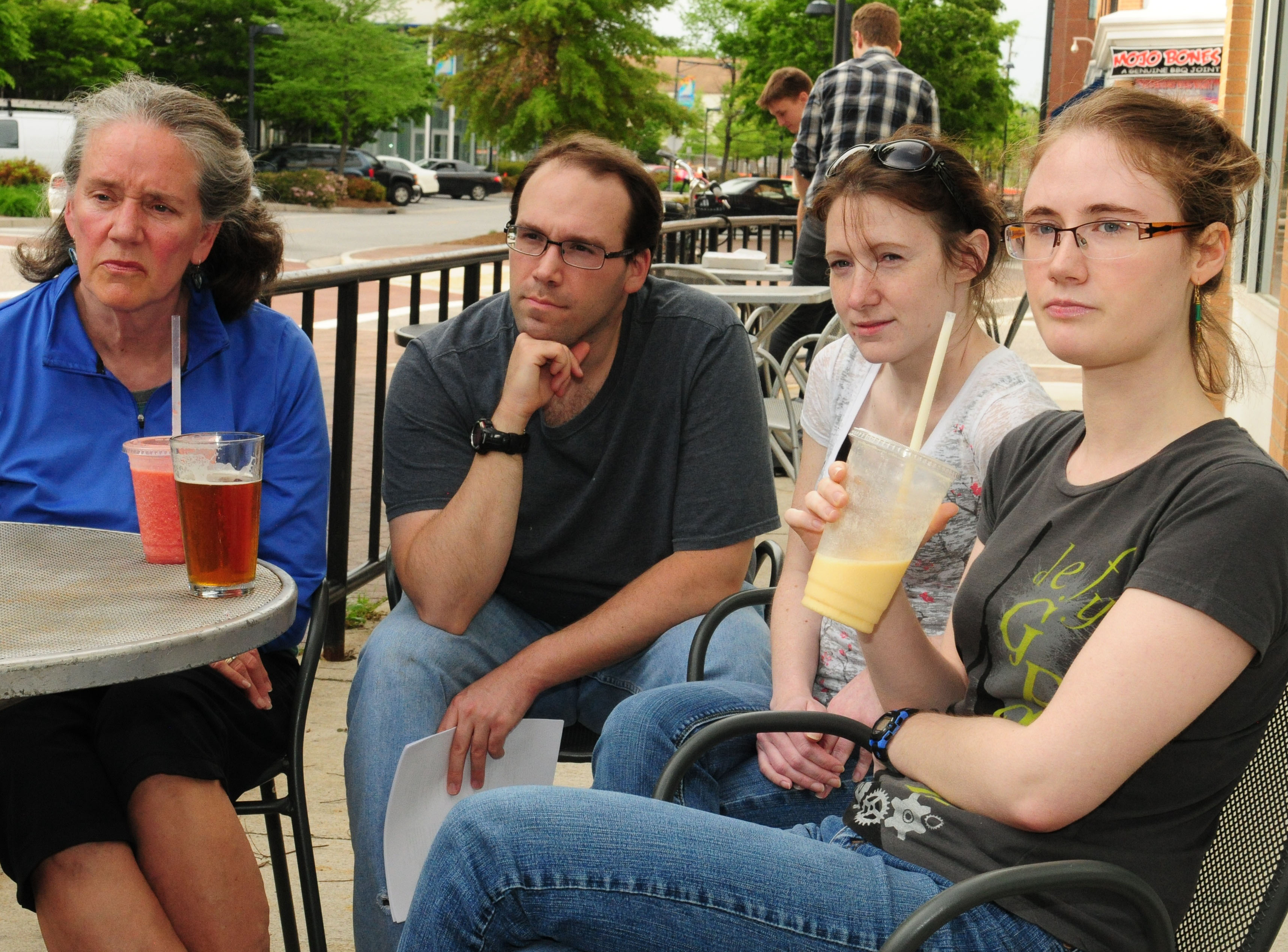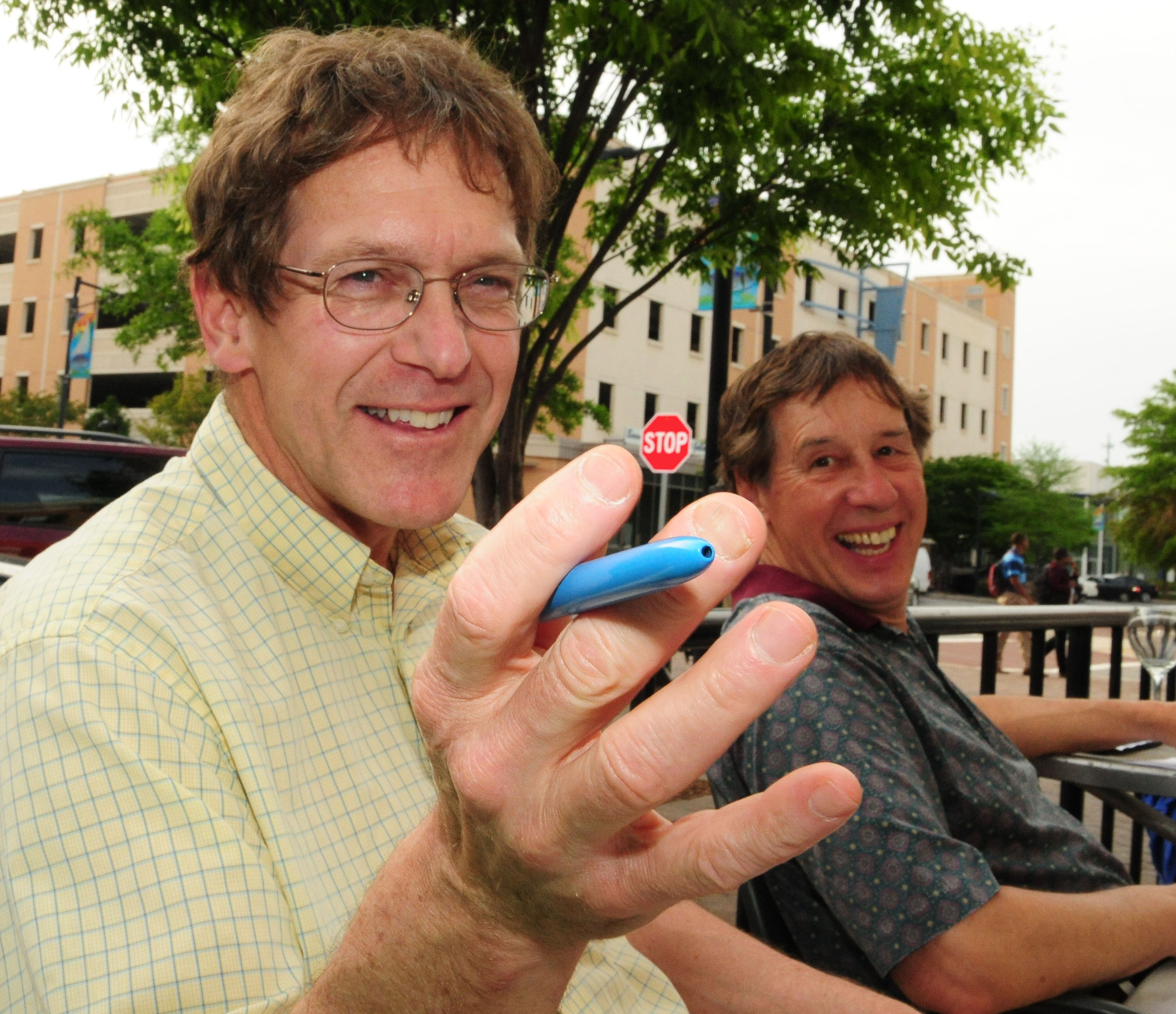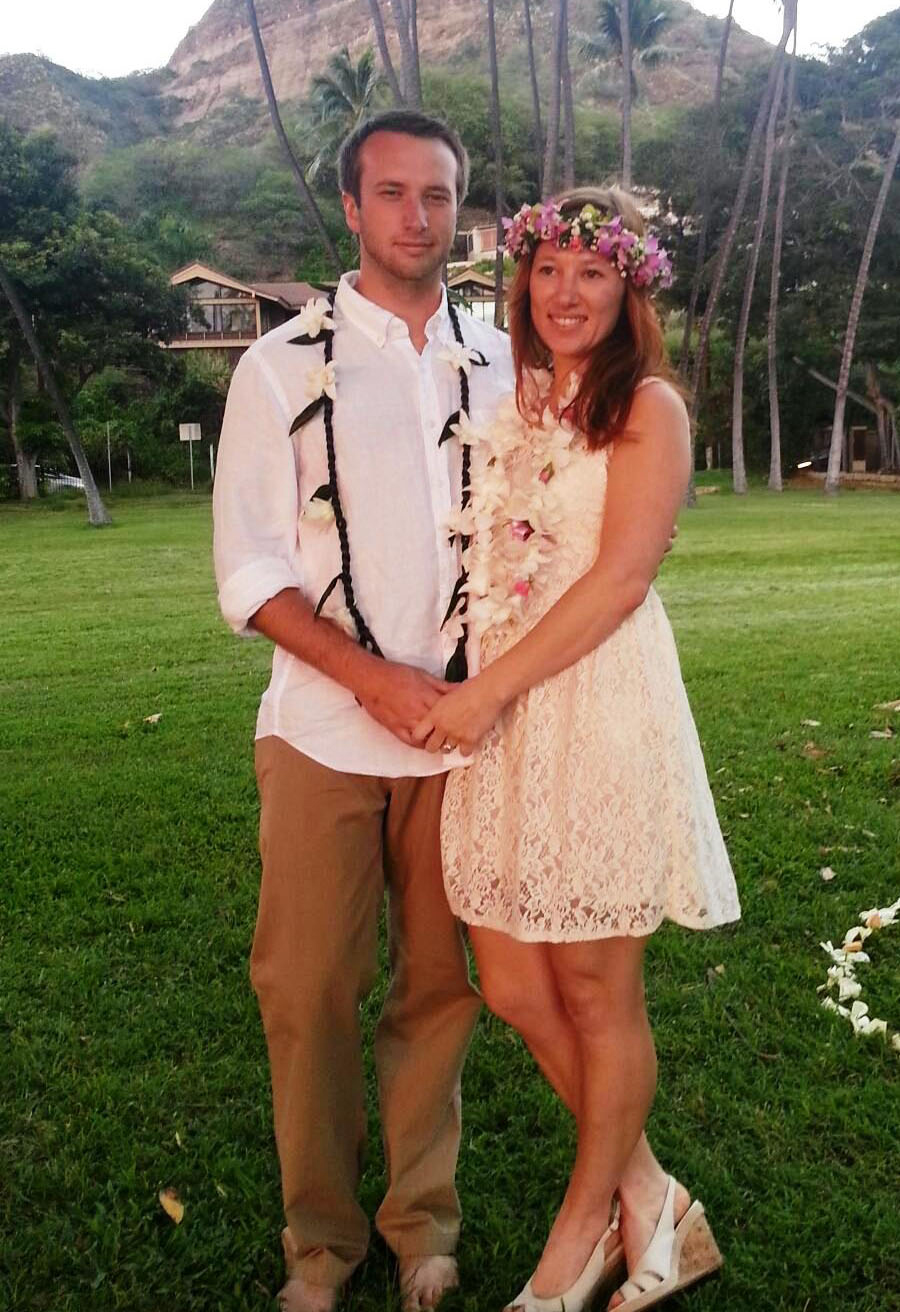Class Taps into the Poetic Side of Scientists
 Janis Smith (from left), C.J. Staryk, Rachel Pleuthner and Zoe Wambaugh at an informal meeting of the poetic scientists.
Janis Smith (from left), C.J. Staryk, Rachel Pleuthner and Zoe Wambaugh at an informal meeting of the poetic scientists.
 Fred Dobbs (left) and Jim Haluska of the poetic scientists group.
Fred Dobbs (left) and Jim Haluska of the poetic scientists group.
 Poetic scientists William Boll and Kristen Anstead at their wedding ceremony in Hawaii.
Poetic scientists William Boll and Kristen Anstead at their wedding ceremony in Hawaii.
By Jim Raper
What happens when scientists choose
To go chasing after their Muse?
They find endless delight
In the poetry they write,
Observational skills in new use.
Don't blame Old Dominion faculty members Janis Smith and Fred Dobbs for flaws in that limerick, but they must confess to inspiring it.
In fact, Smith, the chief departmental adviser in English and a lecturer in composition and literature, and Dobbs, an expert in the ecology of microorganisms and a professor in the Department of Ocean, Earth and Atmospheric Sciences (OEAS), have been responsible for a lot of poetry writing at ODU over the last year and a half.
None of the people doing this creative writing, including Smith and Dobbs, as well as 10 graduate students in oceanography, consider themselves to be poets. But they sure are dedicated students of poetry.
The origins of the one-credit course Scientists and Poets (OEAS 695) stretch back to early in this decade. Smith and Dobbs are neighbors a few blocks off campus and they often run into each other while walking their dogs. In one of their conversations, the topic of poetry came up and an idea sprouted: Can we create an informal course that explores the relationship between science and poetry?
In January 2013, nine oceanography graduate students summoned the courage to sign up for OEAS 695, despite the blurb that Dobbs had written for it: "This course will offer insight into scientific thinking and poetic inspiration. Students will read and discuss poetry written by poets and scientists. ... This course will be dangerous; there will be exercises in reading poems aloud and even (gulp!) writing poems. You should not enroll if you are prone to heart palpitations or enjoy cocktail parties at which you have nothing to say."
That spring semester in 2013 passed without a hitch. The students learned about various types of poems, heard from published poets (including ODU faculty members Tim Seibles and Rene Olander) and participated in inspiration prompts, such as a slow, observant walk outside the science buildings. By the end of the semester, the students, together with Smith and Dobbs, had produced a 35-page "Book of Unlicensed Poetry," copies of which were presented to Charles Wilson, dean of the College of Arts and Letters, and Chris Platsoucas, dean of the College of Sciences.
The course might quickly have dissolved into a pleasant memory, but this "community," as several participants described it, simply refused to disperse. The students took it upon themselves to arrange informal meetings and poetry writing workshops into the summer of 2013. Smith invited the gang to her house in August of that year for a dinner and evening of poetry reading. In 2014, the group - most of the originals and one newcomer, also an oceanography graduate student - kept meeting to debut their new poems and critique those of their classmates. Smith and Dobbs attended sessions whenever possible.
"What teacher wouldn't be pleased to have students continue with the course's subject matter well after the semester has ended?" Dobbs said at one of the informal class sessions in May of this year at Borjo Coffeehouse in the University Village. (It was at that session that the writer of this article was inspired to pen the limerick above.)
Poems the students have written tend to hug more closely to science than to well-worn poesy themes, such as romance or courage. Two of the young authors wrote verse based on their dissertations. Most of them also identified relationships between science and poetry, such as attention to detail and wide-ranging creativity.
Nevertheless, romance did find its way into the process; two of the original students in OEAS 695 eloped earlier this year. Kristen Anstead and William Boll sat next to each other in the class and struck up a friendship that evolved into their dating by fall 2013. Without telling anyone except their parents, they arranged to be married while they were both at an Ocean Sciences Meeting on the island of Oahu, Hawaii. "It took place on February 25th at sunset," Boll said in his newfound poetic voice.
"The poetry class and the follow-up group that we have formed have definitely given me a sense of community," Anstead said. "I always look forward to getting together and it is such a relief to be able to talk about things outside of research, or about research but in a different context. You get to know people in a new way when they are trying to express themselves creatively rather than just through research."
Zoe Wambaugh, the newest member of the group, said young researchers are so busy in their labs that they typically do not focus on casual conversation, "but in this group you really get to experience other people."
George McLeod, who works as lead GIS systems engineer for ODU's Information Technology Services and is a doctoral candidate in oceanography, likes the opportunity the poetry sessions give him to "be free of strict scientific structure." And, he added, "The primary reason that I took the class was to push my personal boundaries, to step out of my comfort zone and to do something unfamiliar, even awkward."
Before he began graduate work in oceanography at ODU, C.J. Staryk earned a bachelor's degree in English. "I've explored both worlds, and I've never really seen a disconnect (between poets and scientists)," he said. "It appears that some people like to simplify the disconnect between creative and analytical. However, a creative streak is needed in science in order to meet challenges that always crop up in research. It's also becoming increasingly important for scientists to communicate to the general public, which requires creativity to turn jargon into something simplified and interesting, while still passing along accurate information."
Boll, who minored in philosophy as an undergraduate, agrees that science is just as creative as the arts. "How else is one able to try new techniques or think outside the box?"
Rachel Pleuthner also sees more connect than disconnect between science students and poetry students. "In both, you have trial by fire, and because of that you bond," she said.
For Jim Haluska, a Ph.D. student at ODU's Center for Coastal Physical Oceanography, there is a partial bridge between the two camps. "In both cases, data collection and research needs to be done before you start. Poetry diverges in that the use and interpretation of the facts are treated differently. For the poet, facts are a starting point and the imagination can lead anywhere, whereas in science the facts and analysis need to support your conclusions."
In the "Book of Unlicensed Poetry," Smith offers her summation: "As the lone non-science major, I am so grateful for the ways in which I learned this semester. While I cannot claim great knowledge of science, I can claim that my interest in it and my understanding of the connectedness of our lives to all around us is dramatically enhanced."
Smith and Dobbs said they are unsure if or when the course will be offered again, but they don't rule it out in order to, as Dobbs put it, "keep this good thing going."
Here are poems selected from "Book of Unlicensed Poetry":
Haiku
The shore meets the sea.
Sand, crabs, dunes, trees, shrubs, and the sky.
We are a small part.
-Jim Haluska
----------------
Cupid is a punk
with a penchant for violence
Don your red Kevlar
-Rachel Pleuthner
----------------
microbes floating in
a sunlit room, feeding and
eating each other.
-C. J. Staryk
----------------
Eight tiptoes ease in
to her bed on the web
knowing he must die
-George McLeod
----------------
We ask for meaning.
Mine might be made of poems,
And yours, of hard truth.
-Janis Smith
----------------
Using otolith
chemistry to ask fish, "Do
You come here often?"
-Kristen Anstead
----------------
Ships motor world wide
Hitchhikers within their bowels
Invasive roulette
-Fred Dobbs
--------------------------------
Other Poems, Sonnets
--------------------------------
In Memory Of
Next to the bench, under the Camellia tree, by the water,
there is a plaque in memoriam for a man I never met.
David Gillispie, 1942-1999, this feels like an unmemorable place
until I see the shrines and monuments hidden in its architecture.
The manmade pond, with its fountain and introduced fish:
In memory of lakes, streams and rivers.
The landscape of scrawny young trees, planted methodically:
In memory of native species and wildness.
There is a building being constructed just over there:
In memory of parking lot,
that was here last year, which was:
In memory of field, that was here before that,
maybe while you were alive, Mr.Gillispie.
This place has memories everywhere!
Someone has scratched a profane drawing of male
anatomy in the wood of the bench:
In memory of decency.
People rush past each other on the sidewalk:
In memory of when we had the time.
I'm trying so hard to remember everything, David.
I have a small wooden box at home on my dresser.
Inside, a pair of pearl earrings:
In memory of my grandmother,
and a strip of black & white photos from a booth:
In memory of that day on the boardwalk with Bobby,
and now I add to it a dried Camellia flower:
In memory of Dave.
-Kristen Anstead
----------------
(Excerpts from) Lord of the Swamp
I am lord of this swamp.
I brandish my yellow
War paint proudly.
My tower shield
Is my defense
Against invaders like you.
My jaw is a solid trap of bone.
I will grip your arm with the fury
Of a dog with its favorite toy.
Stop walking closer!
Let me just turn my bulk
And dare you to approach.
Touché, you show no fear.
Ah, nevermind, I'll just slide
Off this rock and
Into the water to hide.
I'm not running,
You no longer amuse me.
I'm still
Lord of this pond.
-C.J. Staryk
----------------
O Plankton, Where Art Thou?
How deep must plankton plunge for food
And not lose sight of the sun?
Driven by the need to propagate
They drift with currents as waters run.
Too small to be seen by an observant eye,
But visible by satellites high in the sky
Transforming sunlight to food that powers the sea,
Incorporating phosphate to ATP
And producing oxygen for the world to breathe.
-Jim Haluska
----------------
Human in the Arena
(after "The Man in the Arena" speech by T.R. Roosevelt, Paris, April 23, 1910)
It is not the baleful critic who counts,
not those who mockingly deride and scoff
loudly at laborers whose burdens mount,
whom, soaked in blood and sweat, heft them aloft.
All the credit, medals, honor, pins fall
to faithful men who require them the least,
heroes bold, bruised and dusty, standing tall
unselfishly against the modern beast.
She who strives and errs again and again
yet undeterred without despairing
and knowing ten defeats for every win,
at worst, failures reached through valiant daring.
Her place not with those cold and timid souls
who never taste defeat nor act so bold.
-George McLeod
----------------
Let Me Count the Waves
How do I love thee? Let me count the waves
as they travel towards the shore, hit the pier.
I calculate frequencies as they near
Then periods, speeds, and how crests behave.
I had to start small and learn more each day
about fluid dynamics, calculus
and bio-aquatic life cycle success,
while memorizing the Chesapeake Bay.
I was shown the world through oceans and coasts.
Three years of study gave the confidence
needed to communicate my science
to those who now need to hear it the most.
What is the end of an era for me
is just the beginning of my oceanography degree.
-Candace Wall
----------------
The Perseids
Our empty alcove curled in hush that night
whilst the cottage holds cousins now sleeping.
Uncle Bern says we'll see comets in spite
of the clouds and the sparks began leaping.
Olympic style feats of swift, scorching grace -
Perseus puts on a show to astound.
In quiet we watch streams of fir'y lace
scorch the eye of algol as they are downed.
Years ago Bern's life flame was stamped away -
a demon of his body's own making.
Abeyant night sky was tar-dark that day,
and his absence still felt, no mistaking.
Some say he's with God or Resting in Peace.
I see him with Pers'us slaying the Beast.
-Rachael Pleuthner
----------------
Virus
I am the most formidable virus.
Man, you fought against us throughout history.
In several battles, you conquered us.
Celebrate your Cadmean victory.
Crow-like man, we are smarter than a fox!
Our countless soldiers can lurk everywhere,
And can change any life to Pandora's Box;
But without help, you can see us nowhere.
You will never find our Achilles' heal.
For us, the Proteus does not mean a thing.
We kill the weak to forge your strength like steel.
Infect all lives, virus in the king.
We are the sword of Damocles to you.
Be careful, or you will meet Waterloo!
-Wenda Li (along with Carmen Zayas-Santiago, were students in the class for whom English is a second or third language.)
----------------
Twelfth Labour
Unseen lands eclipsed for eternity,
defeated minds become everlasting.
A guardian creature given as charity,
maintains the realm written as his casting.
For one being's final redemption task,
subdue the three crowned beast with grotesque masque.
Proving himself among the impartial gods,
enduring all labours against all odds.
The stage is now set for a battle to ensue,
as ancient leviathans oppose thy brother.
For divinity knows a misconstrued view,
mortals kept hidden as they must suffer.
Balance is honored for such scenes.
What then are the heroes without their fiends?
-William Boll
----------------
Missing My Sun
Where are you Sun?
I have been looking and searching for you
I want to feel my skin burning
To see it darker
To walk around in my Sun dresses
Please come back
I will dance and play for you
You will hear my drum
Please come back
I implore you
-Carmen Zayas-Santiago

